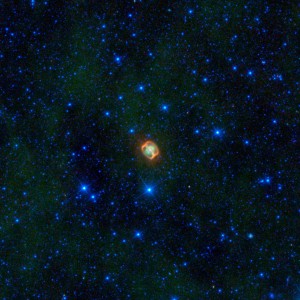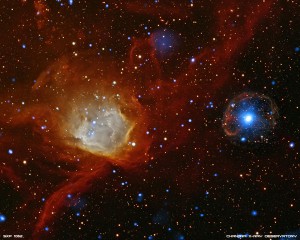To hear my blog post read aloud, just click the play button. If you’re reading this in an email, you may have to click here to hear the post on my site.
The heavens declare the glory of God, and science explores His handiwork.
Why are we, the Church, so afraid of science? Are we fearful that our God will turn out to be a sham?
I will always maintain that we have nothing to fear from science. If science is man’s way of figuring out our world, of using our God-given intellect and reason to understand the works of God, than we should be able to enjoy the breakthroughs of science rather than trembling every time a new discovery is made.
After all, truth is truth. Truth cannot disprove truth. ~ Francis S. Collins, head of the Human Genome Project
When we attack the findings of science without fully understanding the facts, we bring ridicule on Christ’s Church, driving away those who are seeking His truth.
It happened before, between the Church and Galileo. I believe it is happening now, between the Church and Darwin.
There is no real conflict between theistic religion and the scientific theory of evolution. What there is, instead, is conflict between theistic religion and a philosophical gloss or add-on to the scientific doctrine of evolution: the claim that evolution is undirected, unguided, or unorchestrated by God (or anyone else). ~ Peters and Hewlett, Theological and Scientific Commentary on Darwin’s Origin of Species
Why does evolution threaten us so? It doesn’t say anything about what was before the Big Bang, whether anything set things in motion so as to produce our current existence, or of what value is our existence.
What goodness or beauty is, why we are here, and what happens next are all questions for theologians, not scientists.
Why can we not follow the urging of Copernicus? To know the mighty works of God; to comprehend His wisdom and majesty and power; to appreciate, in degree, the wonderful working of His laws, surely all this must be a pleasing and acceptable mode of worship to the Most High, to whom ignorance cannot be more grateful than knowledge.
Science can be worship.
Seeking to understand the stars and the oceans, attempting to comprehend the laws that govern our universe, yes, even the study of evolution, all of this can be worship.
Science is moving forward. New breakthroughs are being made and people are deciding what to do with those discoveries.
The ethics of how to use such new findings will be debated with or without people of faith sitting at the table. We, the Church, have a responsibility to join in the conversation, to learn the facts and not get defensive about where those facts will lead.
The need to succeed at (figuring out these ethics) is just one more compelling reason why the current battles between the scientific and spiritual worldviews need to be resolved – we desperately need both voices to be at the table, and not to be shouting at each other. ~ Francis S. Collins
So let’s stop shouting and begin talking. Please. For the sake of the Church. For the sake of us all.
*****************************************************
Note: I am not a scientist. I am not qualified to argue the specifics of whether or not evolution is true. Yet like it or not, evolution is now the accepted truth of how life came to be, and we must have a conversation about how to accept evolution within the Biblical worldview of our Christian faith, or to at least accept those Christians who do accept evolution as truth. Why? Two reasons: The first is that so many intelligent people are being driven away from Christ because we, the Church, continue to dismiss evolution out of hand, becoming defensive and angry whenever the topic is broached. The second is one I brought up at the end of this essay, the ethical issues that are here now and those that will be coming in the future. We must be present for both of these kinds of conversations. Our world needs us, as representatives of Christ, to be present, not fearful and defensive, for conversations about evolution. God can handle evolution. Evolution is not something to be feared but something to be thought about deeply, pondering how it could fit within our Biblical framework.
If you are truly interested in reading more about this topic from a Christian and scientific perspective, I highly recommend The Language of God: A Scientist Presents Evidence for Belief by Francis S. Collins. Collins is a committed Christian and a brilliant scientist. You may be familiar with his scientific work as the head of the Human Genome Project.
by Francis S. Collins. Collins is a committed Christian and a brilliant scientist. You may be familiar with his scientific work as the head of the Human Genome Project.
I understand that this can be an inflammatory topic. If you choose to comment, please keep your conversation seasoned with grace and, above all, love. Thank you, dear readers.
Art credit: all space photos are from NASA; all other photos are my own, copyright Elizabeth Giger, 2017
(The book link is an Amazon affiliate link through which you can support my writing at no extra cost to you.)



























